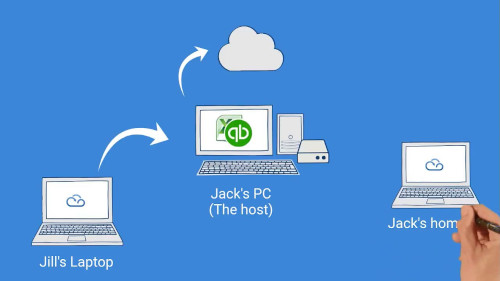The coronavirus pandemic has become the most talked about topic on the internet. As it continues to sweep across the globe, people have taken to staying indoors to mitigate the spread of the contagion. It’s no wonder the internet has become the central place where people can share their fears, anxieties, and information while in quarantine.
According to Google, “Since the first week of February, search interest in coronavirus increased by +260% globally.” Uncertainty surrounding the virus has seen people search for travel advisories, vaccine information, symptoms, and prevention tips.
The hunger for information on CODVID-19 has never been higher, and is subsequently shaping up to be the biggest search trend in history. At the same time, there is also a surge in traffic for related topics that are a direct response to the pandemic. Search queries such as hand sanitizers, face masks, social distancing, handwashing, and concerns on the impact on business, have also experienced spikes in traffic.
So what does the data tell us about remote work trends?
Remote Work Google Trends
The Economic Policy Institute estimates 3 million jobs will be lost in the U.S by summer 2020 because of coronavirus. A survey carried out by leading academic economists released on March 12, found that the majority of people think the outbreak is likely to cause a major recession. The panic and turmoil caused by the virus is spilling into both the financial market and the economy.
With the World Health Organization declaring coronavirus as a pandemic and encouraging people to practice social distancing, businesses have also had to re-evaluate their strategies. When it comes to collaboration trends and digital productivity, most companies haven’t yet committed to investing in full-blown remote working strategies. Companies have been forced to build resilience in their operations and products or close down.
The surge in remote workers as the virus continues to unfold has created a need for companies to upgrade their effectiveness to reduce the impact on their customers, suppliers, and employees. As a result of the outbreak both remote work and remote job searches on Google are seeing noticeable rises in search volume.
As seen from the data, interest in remote work when compared to the same period the previous year, jumped up +185%. Likewise, searches for remote jobs, when compared to the previous year saw interest jump +95%.
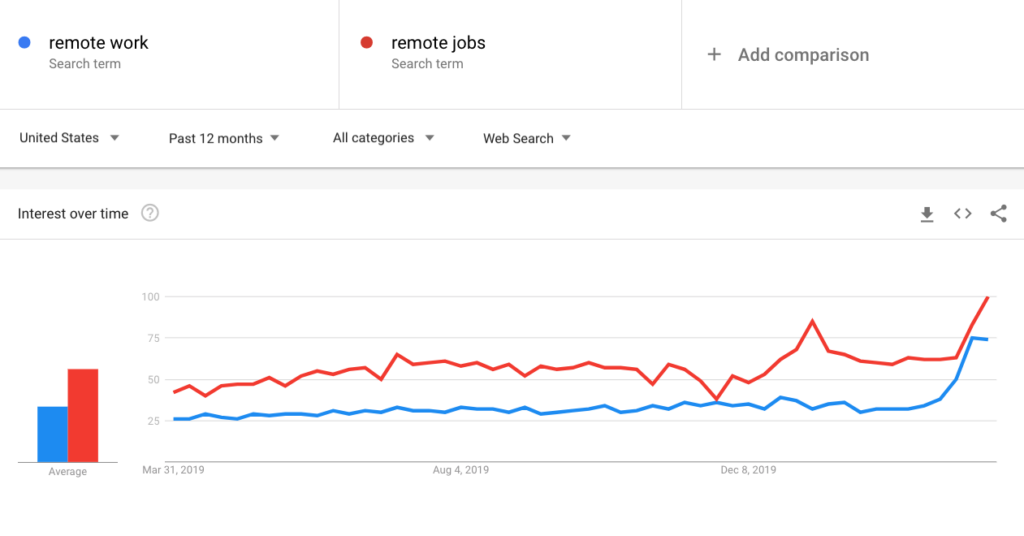
* Data taken from Google Trends up to 21 March.
Similarly, as cases of COVID-19 have continued to increasingly surged over the last few weeks, so too have have search trends for remote work and remote jobs, with both search queries seeing a whooping surge in online searches, jumping up +167% and +127% retrospectively.
It seems the demand for access to remote working is greater than ever.
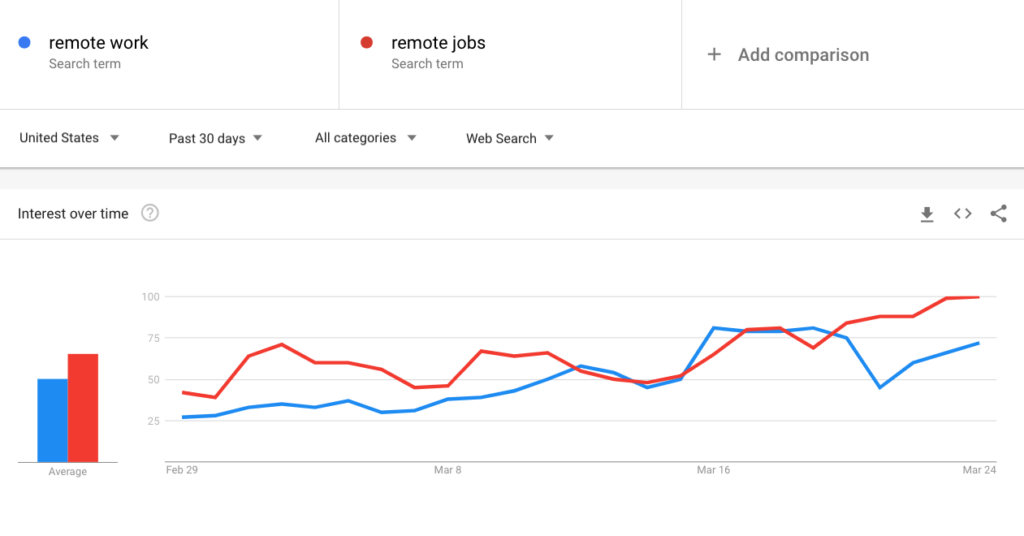
Even Google rolled out free access to their advanced Hangouts Meet video conferencing and G Suite to help remote workers and students remain productive.
Many employees are experiencing remote work for the first time while others are looking for jobs that will provide remote work solutions.
According to Good Trends the top states searching for remote work and remote jobs are as follow:
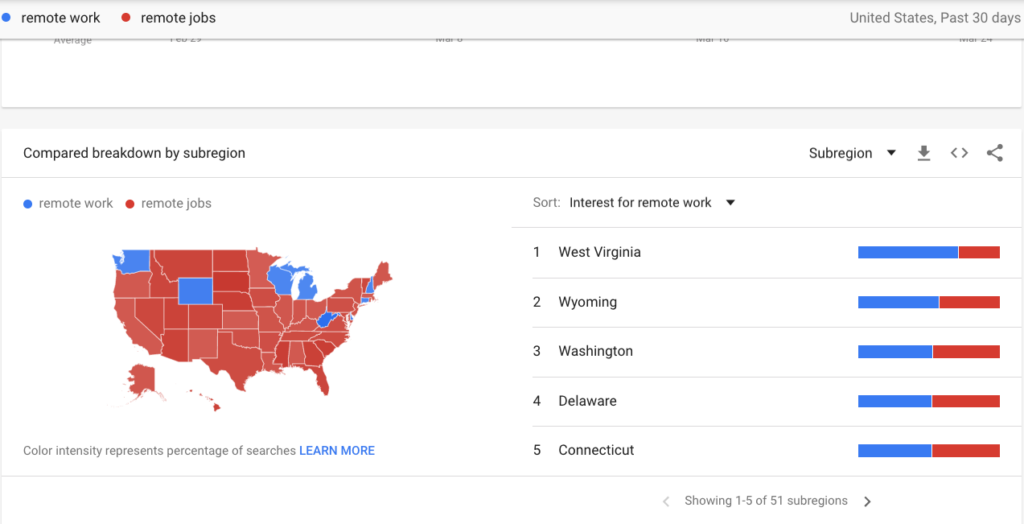
Remote Work Trends by State
Over the past 30 days, searches online have seen remote working tips increase by 300%.
The top 5 searches for remote work include:
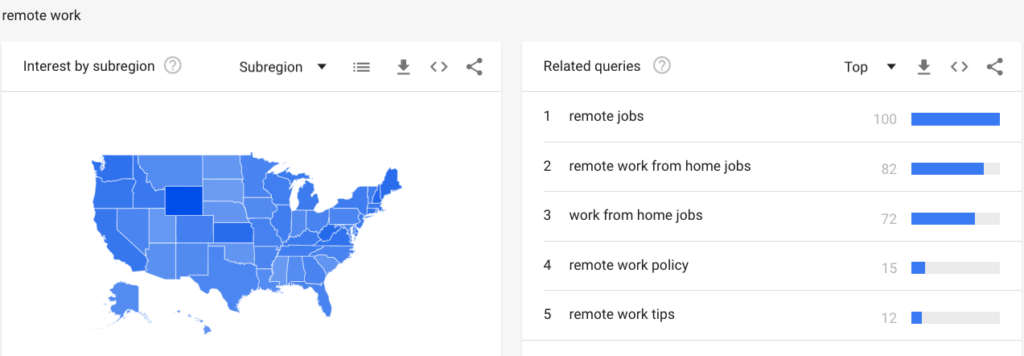
With many companies asking their employees to telecommute, employees are keen to maintain their productivity. The search for remote work tips is another sign highlighting people’s need to maintain a productive workflow while working from home, which for many is likely a new venture. Both managers and employees are all looking for remote work policies and best practices to meet their targets. A remote working mindset and culture can only be cultivated through digital learning, open participation, and inclusion of everyone involved.
Hard hit places like Seattle have had employees from Amazon, Google, Facebook, and Microsoft work remotely. Washington, Massachusetts, New York, and California have more remote work-related searches, most likely due to the extensive surge of coronavirus cases in those states.
The rising searches for remote work
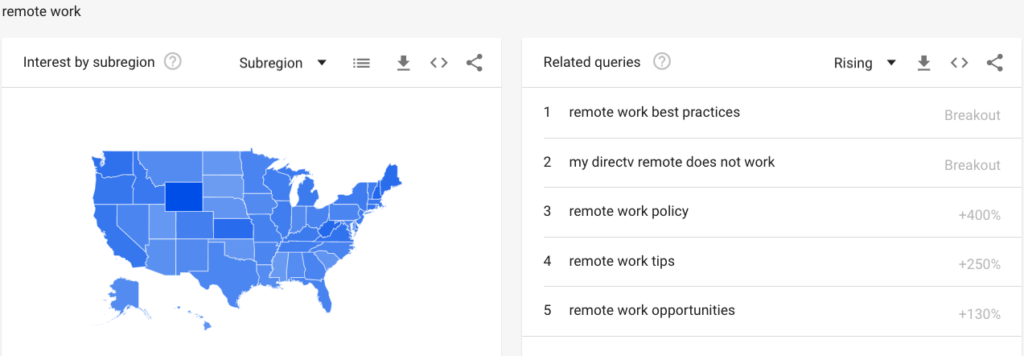
Once again rises in queries suggest that people are looking for not only remote work opportunities, but tips and guides on how to do remote working effectively.
Remote Job Trends by State
The shift from the office work environment has been uncertain for local businesses like restaurants as they have no customers. Many businesses have had to either shut down, send their employees home or cut down services. Most small businesses can’t afford to continue paying workers for long without some revenue stream.
Social isolation is not only affecting the brick and motor business but everyone’s livelihood at the most basic levels. According to the Bureau of Labor and Statistics, only 1/3 of the hospitality and leisure workers have paid off-time benefits.
From freelancers to independent contractors, vendors, delivery workers, event planners, among others are seeing their work disrupted. So, how do you prepare and handle the sudden drop in income? Looking for an alternative source of income to boost your cash flow while you cut down on your expenses is your solution.
The decrease in income and loss of jobs has seen people increase their search for remote jobs.
The top 5 searches for remote jobs include:
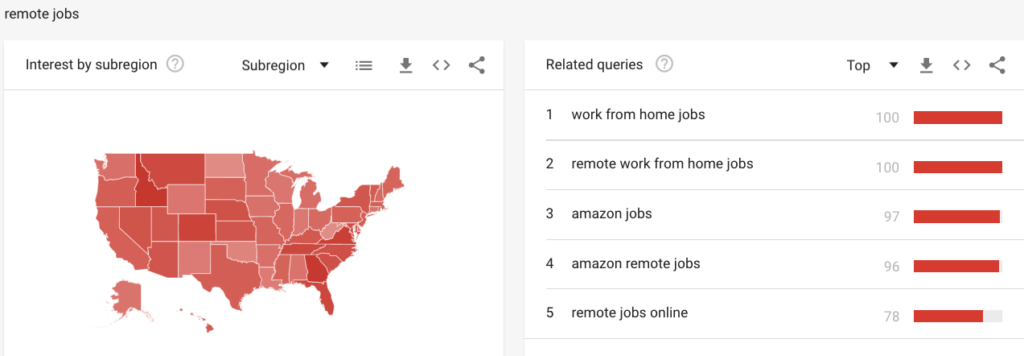
Industries like Amazon have announced to hire 100,000 more workers and give raises to their current workers amid the coronavirus, a direct result of the increase in demand for goods from online stores.
It is perhaps not a surprise therefore that both top searches and rising searches include Amazon jobs.
The rising searches for remote jobs
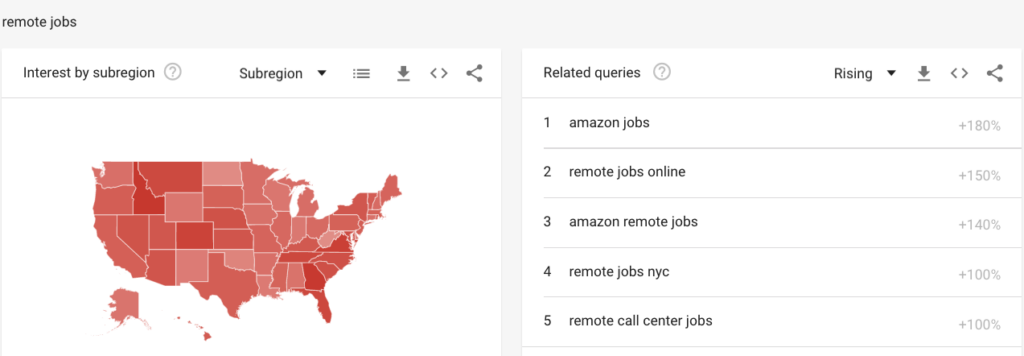
As more and more people are working remotely, companies need to have remote infrastructure and policy guidelines. Coronavirus has accelerated the future of work and the profits will keep it in place. Travel costs will drop, automation will increase workforce augmentation, and commercial real-estate costs will fall. Remote desktops and cloud technologies have businesses re-evaluating the technologies they are using. Even HR practices are shifting to online recruitment and with fewer people in a confined space, the lower the human resource issues to investigate.
To enable remote work, companies need to develop a safe and operational groundwork for remote digital access. Employees should be provided with internet access, remote working devices, secure remote access to business information and assets, and effective collaboration/communication tools.
With MyQuickCoud, you can easily convert your entire IT infrastructure into your company private cloud. Our solution will help you gain access to all your applications and company data remotely via a secure platform. All your data is located on one central remote desktop known as the host. Your employees can use their log-ins to access data and work on it at the same time without interruptions.
This cloud-based remote work platform enables employees to work across multiple locations without any technical issues. Setting up a remote work platform for your employees shouldn’t be rocket science. You can easily follow the step-by-step guide or have our expert on boarding specialist to help you.


